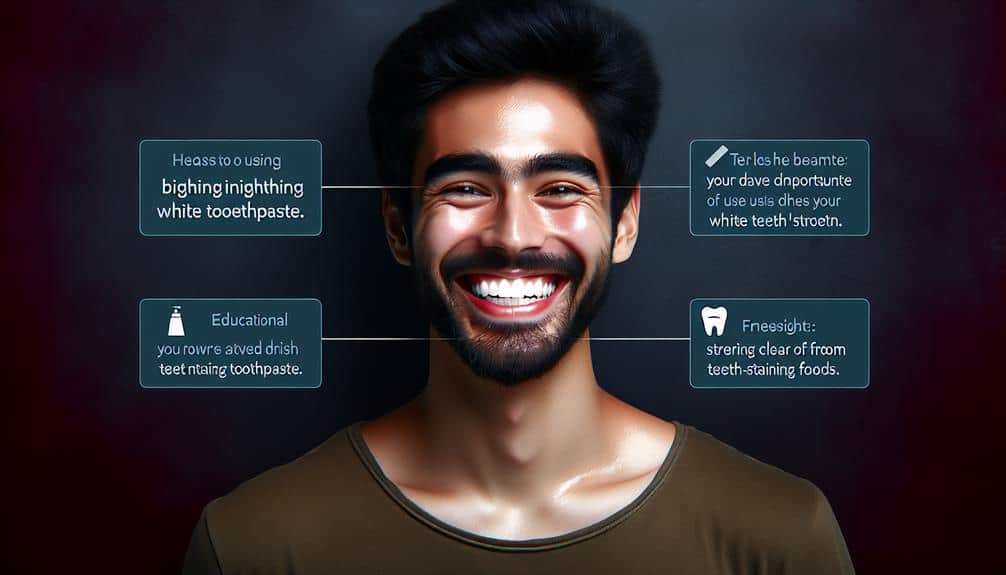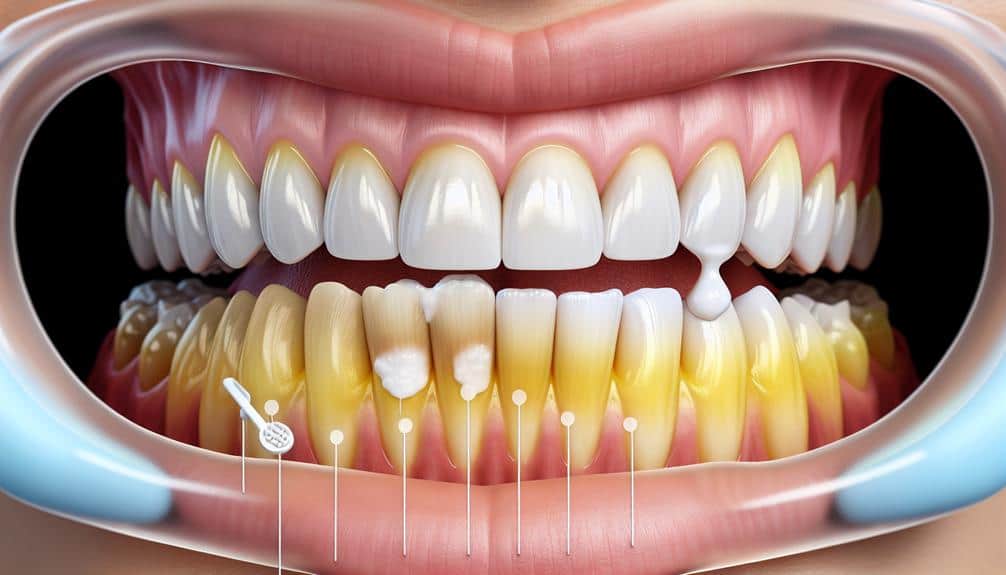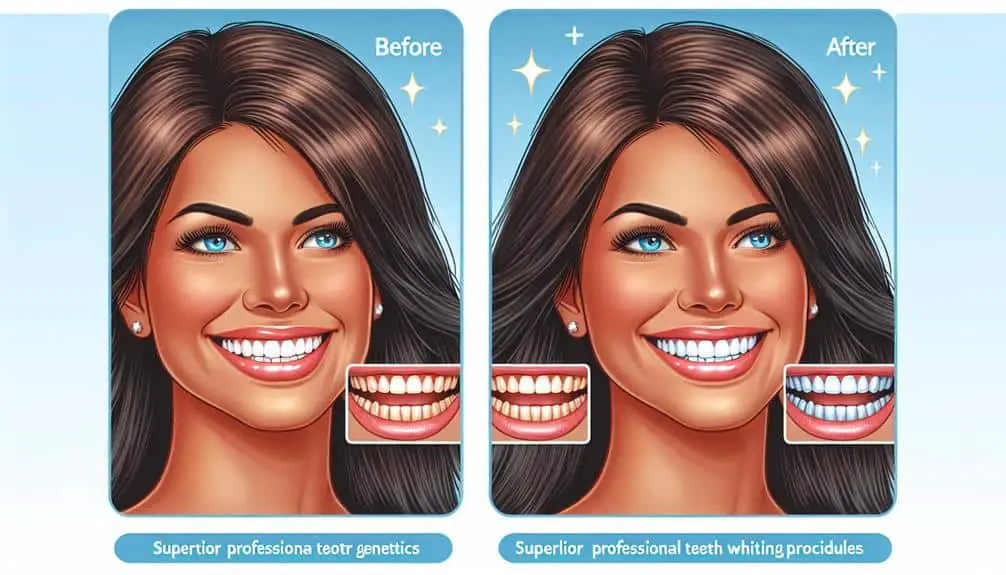Achieve a brighter smile with professional in-office whitening procedures using laser technology for quick results. Home whitening kits with custom trays guarantee even coverage of whitening gel. Whitening toothpaste and mouthwashes, like ADA-approved ones, can help remove surface stains and maintain freshness. Target specific areas with whitening strips and consult a dentist before starting any treatment for genetic tooth discoloration. Consider natural remedies like oil pulling, coconut oil, and baking soda but be cautious with excessive use. These solutions can be effective, but more options await for enhancing your smile.
Key Points
- Professional in-office whitening procedures offer advanced techniques for effective results.
- Custom trays in at-home kits ensure even whitening gel coverage.
- Whitening toothpaste and mouthwashes help remove surface stains and freshen breath.
- Whitening strips with hydrogen peroxide gel target specific areas for brightness.
- Natural remedies like oil pulling and baking soda may aid but may not match professional whitening.
Professional In-Office Whitening Procedures
When considering professional in-office whitening procedures for tooth discoloration, it's essential to consult with a licensed dentist to determine the most suitable treatment plan for your specific needs. Among the innovative methods available, laser technology and Zoom whitening stand out as highly effective options.
Laser technology is a cutting-edge approach that involves the use of a specialized light to activate the whitening agent applied to your teeth. This process accelerates the bleaching process, resulting in noticeably whiter teeth in a shorter time compared to traditional methods. The precision of laser technology guarantees targeted treatment, minimizing the risk of sensitivity often associated with teeth whitening procedures.
Zoom whitening, on the other hand, is a popular in-office treatment that delivers dramatic results in just a single session. This procedure involves applying a whitening gel to your teeth and then using a special light to enhance the bleaching process. The combination of the Zoom whitening gel and light can effectively lighten your teeth several shades, providing immediate and long-lasting results. Consulting with your dentist about these advanced techniques can help you achieve a brighter, more confident smile.
At-Home Whitening Kits With Custom Trays
For effective tooth whitening at home, consider utilizing custom trays in conjunction with whitening kits tailored to your needs. Custom trays are essential for guaranteeing that the whitening gel covers all surfaces of your teeth evenly. To maintain the effectiveness of your at-home whitening treatment, it's vital to follow proper tray maintenance protocols.
Tray maintenance involves rinsing the trays with cool water after each use and allowing them to dry thoroughly before storing them in their case. Additionally, gentle brushing with a soft toothbrush and mild soap can help prevent the buildup of bacteria on the trays.
Customization of trays is equally important to achieve best results. Ill-fitting trays can lead to uneven whitening and potential gum irritation. Hence, it's recommended to have your trays custom-made by a dental professional to ensure a perfect fit.
Whitening Toothpaste and Mouthwashes
Consider integrating whitening toothpaste and mouthwashes into your daily oral care routine to help maintain a brighter smile. Whitening toothpaste often contains abrasive particles or chemicals that aid in removing surface stains on teeth. Look for products with the American Dental Association (ADA) Seal of Approval to make sure they're safe and effective.
Mouthwashes can also assist by freshening breath and reducing bacteria that can lead to plaque and gum disease. Some whitening mouthwashes contain hydrogen peroxide or other whitening agents to help enhance the brightness of your teeth gradually.
In addition to using these products, it's important to take into account dietary choices and lifestyle changes that may impact tooth discoloration. Avoiding foods and beverages that stain teeth, such as coffee, tea, and red wine, can help uphold a whiter smile. Regular dental cleanings and fluoride treatments are also vital for overall oral health and can complement the effects of whitening toothpaste and mouthwashes.
Whitening Strips for Targeted Treatment
Integrate whitening strips into your oral care routine for targeted treatment of tooth discoloration, enhancing the brightness of your smile effectively. Whitening strips are designed with a thin, flexible plastic layer coated with a targeted whitening gel that adheres to the surface of your teeth. The gel typically contains hydrogen peroxide or carbamide peroxide, which helps break down stains and lighten the color of your teeth.
These strips are convenient to use and can reach areas that might be challenging to access with a toothbrush. For more precise application, consider using precision bleaching pens, which allow you to target specific teeth or areas that require additional whitening.
When using whitening strips, follow the instructions carefully to avoid potential gum irritation or tooth sensitivity. Consistent use over a few weeks can lead to noticeable improvements in the whiteness of your teeth. Remember to consult your dentist before starting any whitening treatment to confirm it's suitable for your dental health.
Natural Remedies for Brightening Teeth
To enhance the brightness of your smile naturally, explore various home remedies for brightening teeth. Oil pulling is a vital remedy where you swish oil around in your mouth to remove bacteria and promote oral health. Coconut oil is a popular choice for this practice due to its antimicrobial properties. Research suggests that oil pulling can reduce plaque and gingivitis, which may contribute to a brighter smile.
Another common natural remedy is baking soda. Baking soda has mild abrasive properties that can help remove surface stains on teeth. It's often used in toothpaste or as a standalone ingredient for teeth whitening. However, it's essential to use baking soda in moderation as excessive use can erode tooth enamel.
While these natural remedies can help brighten your teeth, it's important to remember that they may not provide the same level of whitening as professional treatments. If you have severe tooth discoloration, consult with a dentist to explore other whitening options.
Frequently Asked Questions
Are There Any Specific Foods or Drinks That Should Be Avoided to Maintain the Results of Tooth Whitening Treatments?
To maintain your tooth whitening results, avoid foods and drinks like coffee, tea, red wine, and dark berries that can stain your teeth. Incorporate preventive measures into your whitening diet to guarantee long-lasting effects.
Can Genetic Tooth Discoloration Be Completely Reversed With Whitening Solutions, or Are There Limitations to How Effective They Can Be?
When considering genetic tooth discoloration, whitening solutions may show limited effectiveness due to inherent factors. While these treatments can lighten stains, complete reversal might be challenging. Understanding the genetic aspects can help manage expectations regarding whitening outcomes.
How Long Do the Results of Professional In-Office Whitening Procedures Typically Last Compared to At-Home Whitening Kits?
For long term maintenance, professional in-office whitening typically lasts longer than at-home kits. The initial cost is higher, but the results are more effective and enduring. DIY options offer convenience and cost savings, but may require more frequent touch-ups.
Are There Any Potential Side Effects or Risks Associated With Using Whitening Strips for Targeted Treatment?
When using whitening strips for targeted treatment, potential risks like gum irritation or tooth sensitivity can occur. Consider treatment alternatives like professional whitening or consulting your dentist for personalized recommendations to minimize these risks.
Are There Any Specific Dental Conditions or Concerns That May Affect the Effectiveness of Whitening Solutions for Genetic Tooth Discoloration?
Consider genetic factors when addressing tooth discoloration. Sensitivity concerns may impact treatment options. Various dental conditions could affect whitening effectiveness. Consult a professional to determine the best approach for genetic tooth discoloration.



